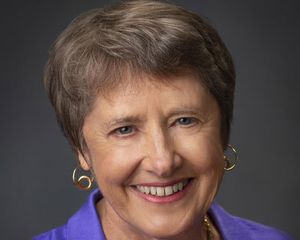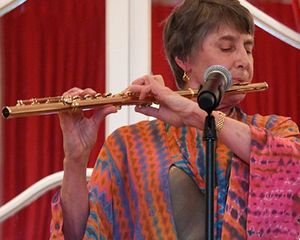“Everyone needs repotting times.” Those words were once spoken by Dr. Jerry Bateman to a young ophthalmologist, who would take them to heart and follow her life trajectory, from a love of music to ophthalmic practice and teaching, medical ethics, assurance of quality international health care and eventually back to her music.
Such is the unfolding world of Susan H. Day, MD, who continues to bring joy and wisdom to each life she touches.

Dr. Day was born in Shreveport, La., and grew up in a house filled with music. Her mother played the piano and was the accompanist for a glee club in which her parents met. Her father also played the piano, as well as the carillon in the Rockefeller Chapel at the University of Chicago, and later became professor of music education at Louisiana State University. With such a family background, a life in music seemed to be her destination. At a young age, Dr. Day began to study piano, play the flute and sing in her church choir. But it turned out that her early experience in music may have been what led her to consider a career in medicine, when a female pediatrician in the choir took the young Day under her wing.
Still uncertain about her future, Dr. Day entered LSU with a major in zoology and a minor in music. But a fascination with embryology and comparative anatomy, as well as a part-time job as a surgical technician, soon convinced her where her true destination lay: her first “repotting,” as it were. So, after graduating magna cum laude, she matriculated at the LSU School of Medicine, where she earned her MD. Her experiences during those years also convinced her that she wanted to be an ophthalmologist. But this led to a rude awakening, when she learned how difficult it was for women to be considered for positions in surgical fields in the southeast United States during the 1970s. It turned out to be a blessing in disguise, however, since it led to one of the most important repottings of her life.
San Francisco in the 1970s was barely on the map for a young lady from Louisiana, but during a fortuitous trip there with the LSU band, to play at the East-West Shriner’s game, she was captivated by the beauty of the region that would eventually become her new home. She returned a few years later for an internship at Letterman Army Medical Center and then her ophthalmology residency at Pacific Medical Center (now California Pacific Medical Center). She recalls the serendipity of entering “the elite worlds of Drs. Bob Shaffer, Bruce Spivey, Bill Spencer, Art Jampolsky, Alan Scott and Bob Stamper.” These luminaries of our profession helped shape her career in such a way that her name would one day be added to that list.
After her residency, Dr. Day completed two fellowships in pediatric ophthalmology and strabismus at The Hospital for Sick Children in London, with David Taylor, and at the University of Iowa, with Dr. Bill Scott. She then returned to her new home in San Francisco, where, with the exception of a brief time at King Khaled Eye Specialty Hospital in Riyadh, Saudi Arabia, she would remain throughout her ophthalmic career. In 1981, she joined the faculty at CPMC as service chief for pediatric ophthalmology and strabismus. She became program director for the residency in 1997 and was appointed chair of the department three years later.
During her years in ophthalmology, Dr. Day rose to international prominence as a clinician and surgeon, an educator, administrator and a leader of our profession. She served as president of the American Academy of Ophthalmology, the American Ophthalmological Society, American University Professors in Ophthalmology and the American Association for Pediatric Ophthalmology and Strabismus and was the chair or member of numerous other organizations and committees. It was my pleasure to serve with her on the American Board of Ophthalmology’s Board of Directors and the Academy’s Senior Ophthalmologist Committee, which she chaired for many years. During these and other encounters with her, I came to love her bright spirit and warm sense of humor, both of which bring joy wherever she goes.
Dr. Day has been in constant demand nationally and internationally as a visiting professor and guest lecturer, which includes 17 named lectures. She has published extensively in her chosen field of pediatric ophthalmology and strabismus and has been the recipient of numerous honors and awards, including the AOS Lucien Howe Medal, the Academy and AAPOS Lifetime Achievement Awards and the Academy’s EnergEYES Award.
In 2014, Dr. Day sensed that it was time for another repotting. With a passion for medical ethics, education, standard-setting and quality assurance in health care both nationally and internationally, she could not resist when the president and CEO of the Accreditation Council of Graduate Medical Education, Dr. Thomas Nasca, offered her a leadership position to help other countries create their accreditation programs. She soon learned that graduate medical education internationally is “the wild, wild west,” with widely disparate standards, and that there was a great need for her services. Over the next six years, she would travel 250,000 to 300,000 miles annually to countries around the world: from Vietnam to Saudi Arabia, Guatemala to Finland, Singapore to Haiti and many, many more. Possibly the biggest sacrifice was leaving her beloved San Francisco to be near the ACGME headquarters in Chicago. But she maintained her home in the Golden State, always with the thought of one day returning.

Susan H. Day, MD playing the flute. Photo taken by Dr. Ralph Eagle,
archivist. Image courtesy of the American Ophthalmological Society.
And now, as Dr. Day contemplates yet another repotting, her thoughts return to her love of music, but this time to combine it with her passion for medicine. Throughout her career in ophthalmology and medical education, music remained an important part of her life. During medical school, she played in a woodwind quintet and later joined a group of ophthalmology musicians who provided noontime concerts for many years during the Academy’s annual meetings. Her most memorable musical experience came in 1982, when she performed Mozart’s D major concerto in Davies Hall with the San Francisco Symphony.
Dr. Day has decided to step down from her position at ACGME, which will become effective at the end of July, 2021. She has been accepted to the Schulich School of Music of McGill University, where she plans to immerse herself for the next few years in studying the science of music with the goal of combining medicine with music.
“I would like to take on a project where both disciplines are essential to make a contribution,” she said. “Specifically, I’d like to explore how musical aptitude develops in people with congenital blindness.” She will continue to play the flute and learn piano to a greater depth, but as for singing, she says, “That will most likely be limited to leading choruses of Happy Birthday.”
And so, the remarkable life of Dr. Susan Day continues to unfold with multiple repottings. And, although it is hard to say precisely where this new chapter will lead, two things are clear. She will continue to bring joy to the lives of others through her dedication to medicine and music. And she will eventually return to her beloved home by the Bay.